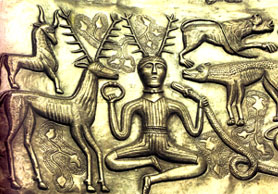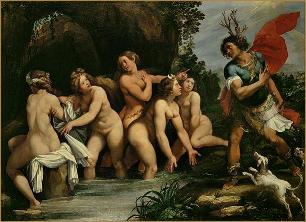
|

|
ANTIQUITY
Cernunnos | Artemis

It's end of Roman Empire, 1st siecle after JC. At this time, deer took a place in european mythology.
Here are some samples from Celts and Greek myths.
|
Cernunnos
|
|
Celts were devoted to a god wearing deer antlers: Cernunnos God. Cernunnos means "the Horned One" or the "Stag Lord". He was the Hell god, Death god, Wealth god, Forest Lord, Fertility god depending of legends. Rut cry of deer was assimilate to the cry of this god and was a death sign. But other legends told this cry was synonym of wealth...
We find traces of this legends on roman monuments or on a gold cauldron found in Denmark (Gundestrap cauldron). We can see him wearing deer antlers, a celtic torque and with a stag near him.
Here is an extract of the legend:
|
 |
" They entered a vast cave. A weak, greenish glow emanated from the partly ploughed-up vault. Upon entering this strange cave, the hunters let out a cry and prostrated themselves on the ground. Opposite them, a curious character waits, sitting cross-legged. He is a noble, old man dressed in Gallic fashion, a gold necklace around his neck and splendid antlers decorated with brilliant rings on his head. "Cernunnos! the Deer-god! ""...
" The old loner, it was him! The god opens the rebounded bag which he holds on his knees. Gold coins escape from it, rolling as far as the hunters "...
"Their eyelids are weighed down. Unable to fight against this numbness, they sink in sleep"...
" When they awake, night has fallen."...
" One of them, which had been arroused, bumps against an obstacle -- the bag! No, they had not been dreaming. Generous Cernunnos, the god of abundance, disappeared, but he left a fabulous treasure for them. " |
Artemis / Diane the Huntress
|
|
We find also the deer in Roman and Greek mythology with Artemis (Diane the Huntress for the Romans). She is the girl of Zeus and Leto, twin sister of Apollo. She is the goddess of hunting and the moon, she is part of the 12 gods of the olympe. She is represented with her arc and a stag or a hoe.
Here is Acteon Legend extract from Metamorphoses of Ovide (Book III, 138-252), translate from latin.
|
 |
|
You tested it, Cadmus, within your prosperity, when your sons caused your first pains. He was changed into stag, and his dogs of his blood watered themselves; but he was not guilty: the chance alone lost it. Could an error thus make it criminal?
Citheron was covered with the blood and the carnage of the hosts of the forests. Already the sun, equal far away from the east and the occident, narrowed the shades, when young Acteon gathers Thebains which the heat of hunting had carried far from him:
"Companions, says him to them, our clothes and our javelins are dyed blood of the animals. It is enough for today. Tomorrow, as soon as the Dawn on its tank of murple brings back the day, we will resume our work. Now that the sun burns the ground of its rays, folds your knotty nets, slackens your clothes, and delivers you at rest." Suddenly Thebains obey, and their work is suspended.
Not far was a crowned small valley of pines and cypress. It is named Gargaphie, and it is devoted to Diane, goddess of the forests. In the content of this small valley is a quiet and dark cave, which is not hand made.
But nature, by forming there a vault of stones pounces and rocks light, seems to have imitated what art has of more perfect. On the right runs a sharp source, and its wave curves and murmurs on a bed of grass.
It is in this limpid water that the goddess, tired hunting, liked to bathe her modest attractions. She arrives in this solitary retirement. She gives her javelin, her quiver, and her arc to her nymph which is in charge of the care to keep them.
One second nymph detaches her turned up dress; at the same time two others untie her shoe; and Crocale, girl of the river Ismenus, more skilful than her compagions, braids and ties the scattered hair of the goddess while her own still float on her breast.
Nephele, Hyale, Rhanis, Psecas, and Phiale spread over the body of Diane with the limpid floods spouting out from their light urns.
|
 |
While Diane bathes in the fountain of Gargaphie,Acteon wandering of a dubious step in this bocage which is unknown for him, arrives in the crowned enclosure, pulled by the destiny which leads him. Hardly he entered the cave where runs a fugitive wave, that the nymphs seeing it, quiver to appear naked, strike their breasts, make resound the forest of their cries, and hasten around the goddess to conceal it from indiscreet eyes. But, larger than her partners, the goddess rose of all the head above them. Such as over the evening a cloud takes the colours of sun fires which goes down on the horizon; or such as shines in the morning the incipient incarnat of the dawn, such reddened the complexion of Diane exposed without veils to a mortal. Though her compagnons in circle around them lined up, she turns her majestic face away. Why haven't she its arc and its features! Without them she arms herself with the wave which runs under its eyes; and throwing to the face of Acteon this avenger wave, she pronounces these words, predict of a nearest misfortune:
|
|
"Goes now, and forgets that you saw Diane in the bath. If you can it, I agree to it ". She says, and sudden on the head of the prince rises a branching wood; his neck lengthens; his ears are drawn up at a peak; his hands are feet; his arms are long legs; and all his body is covered with a mottled skin. To these fast changes the goddess adds fear. He flees; and in his race he is astonished by his lightness. Hardly in a limpid water he saw his new figure: "Unhappy how I am!" wanted he to exclaim; but he does not have any more a voice. He groans, and it was his language. Long tears ran on his cheeks, which do not have any more their initial form. Alas! He had of the man preserved only the reason. What will make this unfortunate? Will he turn over to the palate of his father? Shame prevents him. Will he hide in the forests? Fear retains him. While he deliberates, his dogs saw him. Melampus, born in Creta, and skilful Ichnobates, come from Sparte, give by their barks the first signal. Suddenly, more rapids that the wind, all the others run. Pamphagos, and Dorcee, and Oribasos, all three of Arcadie; proud Nebrophonos, cruel Theron, follow-up of Lelaps; light Pterelas, skilful Agre to ventilate the traces of game; Hylee, recently wounded by a savage wild boar; Generated Nape of a wolf; Pemenis, which formerly went to the head of the herds; Harpyia, follows by its two children follow; Ladon, of Sicyone, with the tightened sides; and Dromas, Canache, Sticte, Tigris, Alce, and Leucon, whose whiteness equalizes snow; and the Asbolus black, and vigorous Lacon; the rapid Aello and Thous; Lycisce, and its brother Cypriote; Harpalos, with the mottled black face of white; Melanee, Lachne, with the roughcast hair; Labros, Agriodos, and Hylactor, to the piercing voice, all three born from a father of Creta and a mother of Laconie; and all others finally that it would take too a long time to name.
This pack, carried by the heat of the prey, pursues Acteon, and springs through the mountains, the sharp rocks or without way. Acteon flees, pursues in these same places where so many times he pursuied the hosts of the forests. Alas! Himself he flees his faithful companions; he would like to shout to them: "I am Acteon, recognize your Master". But he cannot make any more hear his voice. However innumerable barks make resound the airs. Melanchetes makes him on the back the first wound; Therodamas bites him then; Oresitrophos reaches him with the shoulder. They had sprung the last within the pursuit, but while following the cut paths of the mountain, they had arrived the first. While they stop unhappy Acteon, the pack arrives, bottom on him, tears him, and soon on all his body there does not remain any place for new wounds. He groans, and plaintive sounds that he makes hear, if they are different from the voice of the man, do not resemble either to the stag. He fills of his cries these places which he so many times traversed; and, such as one begging, bending the knee, but not being able to tighten his arms, he turns in silence around him his languid head.
However his companions, ignoramus his sad destiny, excite the pack by their accustomed cries; they seek Acteon, and believing him distant from these places, they call him with the envi, and wood resound of his name. The unfortunate one turns over the head. One complained about his absence; he was considered it regrettable that he could not enjoy the spectacle of the stag to its last barks. He is only too present; he would like not to be it; he would like to be pilot, and not victim. But his dogs surround it; they insert their cruel teeth in all his body, and tear their Master hidden in the shape of a stag. Diane finally believed herself avenged only when, per so many wounds, the dreadful demise had finished his days.
|

|
|

|

|
|